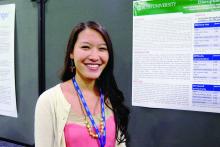ATLANTA – Answers on a popular self-reported sleep questionnaire correlated positively with sinonasal inflammation, suggesting that patients with chronic rhinosinusitis should be assessed for sleep-related problems, results from a single-center study showed.
“We need to be recognizing the symptoms of chronic rhinosinusitis patients more in order to help them improve their quality of life,” lead study author Jessica Hui, MD, said in an interview at the annual meeting of the American Academy of Allergy, Asthma, and Immunology. “Asking them about sleep is important.”
In an effort to identify the chronic rhinosinusitis (CRS)–related factors associated with poor sleep quality, Dr. Hui and her associates at Rush University Medical Center, Chicago, administered the Pittsburgh Sleep Quality Index (PSQI) to a cohort of 125 CRS patients with refractory disease and 41 controls. Patients with obstructive sleep apnea were excluded from the study. A self-report questionnaire that contains 19 items, the validated PSQI, assesses sleep over a 1-month time period. Scores below 5 indicate normal sleep quality. The researchers reviewed patient charts for CRS characteristics, including nasal polyps, histopathology of the sinus tissue (such as neutrophilic inflammation, eosinophilic inflammation, fibrosis, edema, and basement membrane thickening), Lund-Mackay Score (a radiographic score of CRS severity), a pain index measured on a visual scale from 0 to 6, the Sino-Nasal Outcome Test (SNOT-22), a subjective measure of CRS severity and outcome, and comorbid diseases including asthma, aspirin-exacerbated respiratory disease, allergic rhinitis, and GERD. They compared the association of PSQI scores with these variables in order to determine factors associated with poor sleep in CRS.Dr. Hui, who is a second-year pediatrics resident at Rush University Medical Center, reported that CRS patients had significant worse sleep quality, compared with controls (a mean PSQI score of 7.44 vs. 3.31, respectively) and that a higher Lund-Mackay Score correlated with greater PSQI (Pearson correlation coefficient of 0.25; P = .03).
The mean age of CRS cases without sleep disruption was 12.08 years, while the mean age of CRS cases with sleep disruption was 34.74 years.
Poor sleep quality was also associated with higher pain index scores (Pearson correlation coefficient of 0.35; P = .002) and higher scores on the SNOT-22 (Pearson correlation coefficient of 0.25; P = .025). The researchers observed that CRS patients without nasal polyps trended towards a higher PSQI, compared with controls (a mean of 8.14 vs. 6.36; P=0.10). Sinus histopathology variables and comorbid diseases did not correlate with PSQI scores.
Dr. Hui reported having no financial disclosures.


